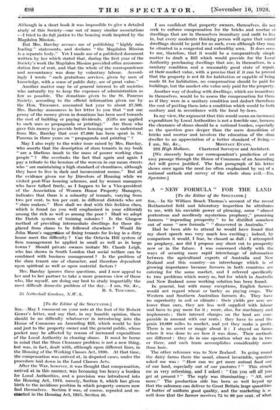[To the Editor of the SPECTATOR] .
SIR,—May I comment on your note at the foot a Sir Robert Gower's letter, and say that, in my humble opinion, there Should be no difficulty whatsoever in introducing into the House of Commons an Amending Bill, which would be fair and just to the property owner and the general public, whose Pocket may be affected by reason of increased 'expenditure of the Local Authority in clearing slums. It must be borne in mind that the Slum Clearance problem is not a new thing, but was, in fact, dealt with, although upon different lines, in the Housing of the Working Classes Act, 1800. At that time, the coMpensation was arrived at, in disputed cases, under the procedure laid down in the Land Clauses Acts.
" After the War, however, it was thought that compensation, arrived at in this manner, was becoming too heavy a burden for "Local Authorities, and a provision was introduced into the Housing Act, 1919, namely, Section 9, which has given birth to the invidious position in which Property owners nOw find themselves. Section 9 was, of course, repealed and re-
I:acted in the Housing Act, 1925. Section 46. • I am confident that property owners, themselves, do not seek to enforce compensation for the bricks and mortar of
dwellings that are in themselves insanitary and unfit to. Jive in, but every, moderate thinking person will agree that sound dwellings should be paid for as such, even although they may be situated in a congested and unhealthynrea. It does seem to me, therefore, that it would be a comparatively simple matter to draft a Bill which would provide fo,r the Local Authority purchasing dwellings that are, in themselves, in a sanitary condition and a reasonably good state of repair, at their market value, with a proviso that if it,can be proved that the property is not fit for habitation or capable of being made fit for habitation, no compensation should be paid for buildings, but the market site value only paid for the property.
Another way of dealing with dwellings, which are insanitary in themselves, would be to assess the compensation for them as if they were in a sanitary condition and deduct therefrom the cost of putting them into a condition which would be both sanitary and in accordance with the local by-laws.
In my view, the argument that this would mean an increased expenditure by Local Authorities is not a forcible one, because the clearance of slums should be a national burden, especially as the question goes deeper than the mere demolition of bricks and mortar and involves the education of the slum dweller to an appreciation of a better standard of living.—
292 High Holborn. Chartered Surveyor and Architect.
[We sincerely hope our correspondent's prediction of an easy passage through the House of Commons of an Amending Act will prove justified. The last paragraph of his letter shows once again the need (so often emphasized by us) of a national outlook and survey of the whole slum evil.—En. Spectator.]












































 Previous page
Previous page